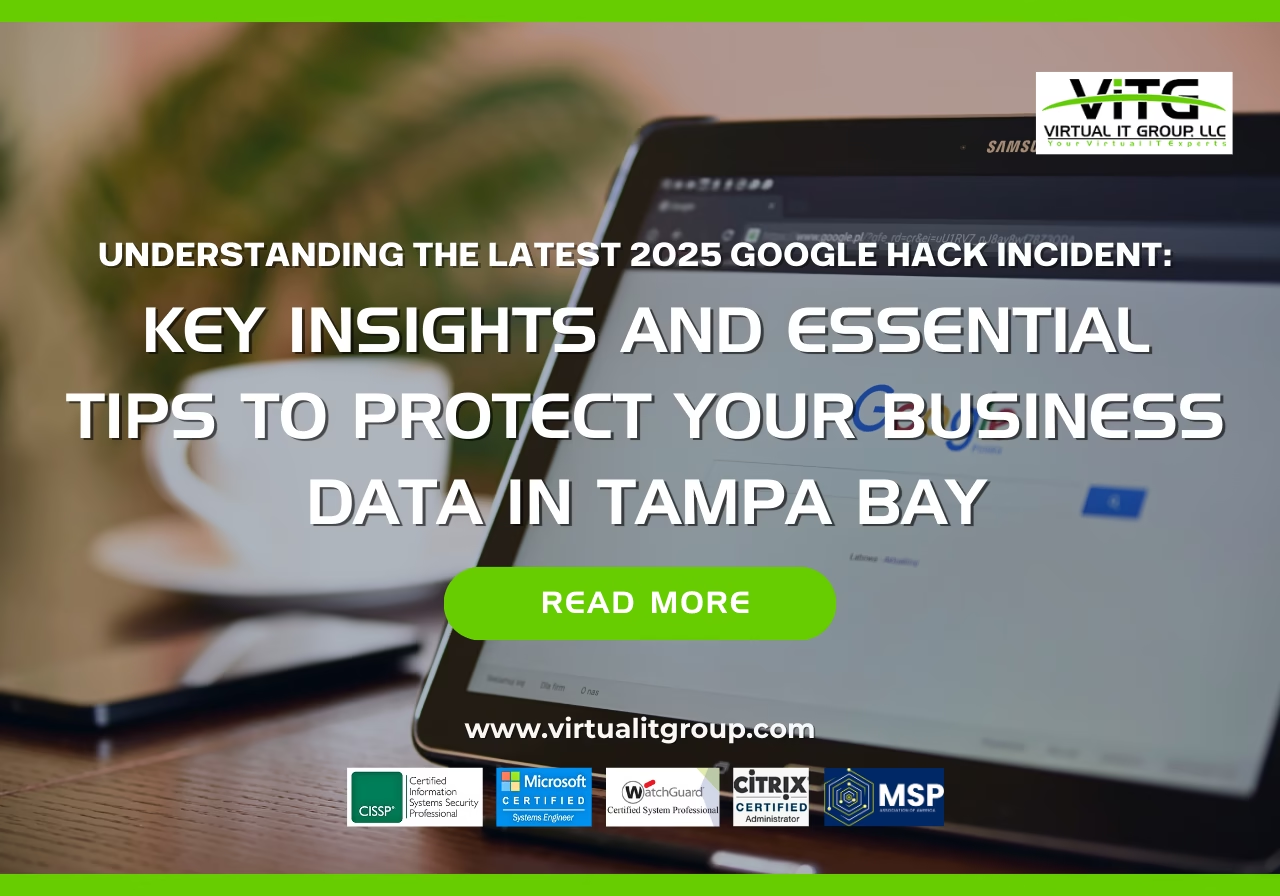Cybersecurity has become a major concern for individuals and organizations alike. The recent 2025 Google hack incident has served as a stark reminder of how even the most prominent technology companies are vulnerable to sophisticated cyberattacks. This breach not only highlights the evolving threat landscape but also underlines the importance of robust cybersecurity strategies for businesses, especially small and medium-sized enterprises (SMBs) in Tampa Bay.
As business owners, IT professionals, and decision-makers, the question isn’t if a breach will happen but rather, how prepared are you to defend against it? In this article, we will provide insightful analysis into the 2025 Google hack, what led to its occurrence, and more importantly, how your business can effectively protect its data and digital infrastructure from similar attacks.
Table of Contents
- What Happened in the 2025 Google Hack Incident?
- How Did the Hackers Gain Access?
- What Data Was Stolen in the Google Hack Incident?
- How Can You Protect Your Business Data in Tampa Bay?
- 1. Implement Multi-Layered Authentication and Two-Factor Authentication (2FA)
- 2. Conduct Employee Security Awareness Training
- 3. Use Strong, Unique Passwords Across All Accounts
- 4. Keep Your Software and Systems Up to Date
- 5. Implement Multi-Layered Endpoint Protection
- 6. Back Up Your Data Regularly
- 7. Secure Your Network with Advanced Firewalls
- Why Partnering with ViTG for Cybersecurity Is the Best Option
- Conclusion

Understanding the Latest 2025 Google Hack Incident: Key Insights and Essential Tips to Protect Your Business Data in Tampa Bay
What Happened in the 2025 Google Hack Incident?
On August 5, 2025, Google’s Threat Intelligence Group (GTIG) confirmed that a cyberattack had targeted one of the company’s internal systems, specifically a Salesforce database used to store business information. This breach was linked to the ShinyHunters ransomware group (also known as UNC6040), which has been involved in several high-profile data breaches in recent years.
The attackers exploited a vulnerability in the Salesforce CRM platform to steal business contact data from small and medium-sized businesses (SMBs). Although Google confirmed that no sensitive personal data was stolen, the breach highlights the growing sophistication of cyberattacks and how even the most secure systems can be breached if proper precautions are not taken.
The attack was carried out using voice phishing (vishing), a method where cybercriminals impersonate a reliable party such as IT support staff via phone calls to manipulate employees into resetting system credentials. The hackers used this method to gain access to Google’s Salesforce system and steal the contact information of affected businesses.
How Did the Hackers Gain Access?
The attackers used a common social engineering tactic known as vishing. Vishing is a form of phishing in which attackers trick victims over the phone into providing confidential information or performing actions that give hackers access to systems. In this case, the attackers impersonated Google IT staff and convinced employees to reset Salesforce login credentials, allowing them unauthorized access to business data.
This type of attack highlights a critical weakness in even the most secure systems: human error. While companies may implement advanced security measures, employees can inadvertently become the weakest link in the security chain, allowing attackers to bypass technical defenses.
What makes this breach particularly concerning is that it underscores a critical vulnerability: even the most secure systems can be compromised if attackers successfully exploit human weaknesses.
What Data Was Stolen in the Google Hack Incident?
The data taken during the Google hack incident primarily consisted of publicly available business information. This includes:
- Company Names
- Business Contact Information (Emails, Phone Numbers)
- Business Notes and client-related information stored in Salesforce instances
While the breach did not expose sensitive personal data such as Social Security numbers or credit card details, the stolen information is still valuable for cybercriminals. It could be leveraged in phishing campaigns, ransomware attacks, or to facilitate further social engineering tactics targeting other businesses or their clients.
Even though the data stolen in the attack may not be considered highly sensitive, it still poses a significant security threat, and its misuse could lead to financial losses, reputational damage, or business disruption.

Understanding the Latest 2025 Google Hack Incident: Key Insights and Essential Tips to Protect Your Business Data in Tampa Bay
How Can You Protect Your Business Data in Tampa Bay?
The Google hack incident is a clear reminder that cybersecurity is critical for businesses of all sizes. While it’s impossible to guarantee 100% protection, there are several steps you can take to minimize the risk of similar attacks and secure your business data effectively.
1. Implement Multi-Layered Authentication and Two-Factor Authentication (2FA)
One of the most effective ways to protect your accounts is by implementing two-factor authentication (2FA). This security measure adds an extra layer of protection, requiring not only your password but also a second verification factor, such as a one-time code sent to your phone or email.
By using 2FA, you make it significantly more difficult for cybercriminals to gain unauthorized access, even if they manage to steal login credentials.
2. Conduct Employee Security Awareness Training
Human error is often the cause of successful cyberattacks. In the case of the Google breach, the hackers exploited human trust to gain access to sensitive data. It is essential to train your employees to recognize phishing, vishing, and other social engineering tactics that hackers often use.
Regular cybersecurity training helps employees understand the importance of data protection and teaches them how to identify potential threats.
3. Use Strong, Unique Passwords Across All Accounts
Weak or reused passwords are a common vulnerability that cybercriminals often exploit. To minimize the risk of a breach, encourage employees to use strong, unique passwords for every account. Avoid using simple or repetitive patterns.
A password manager can help employees store and manage their passwords securely, ensuring that each account is protected with a unique and complex password.
4. Keep Your Software and Systems Up to Date
Outdated software is one of the primary entry points for cybercriminals. Regularly update all software, operating systems, and applications to ensure that they are patched against known vulnerabilities.
Enabling automatic updates is one of the best ways to keep your systems secure without requiring manual intervention.

Understanding the Latest 2025 Google Hack Incident: Key Insights and Essential Tips to Protect Your Business Data in Tampa Bay
5. Implement Multi-Layered Endpoint Protection
To safeguard devices like laptops, desktops, and mobile phones, install advanced antivirus software, firewalls, and malware protection. Protecting each endpoint within your network ensures that no device is left vulnerable to attack.
Endpoint protection tools offer real-time monitoring and threat detection, helping to identify malicious activities before they can affect your systems.
6. Back Up Your Data Regularly
Ensure that your business data is regularly backed up, and store these backups in a secure, cloud-based system. Having a reliable backup strategy ensures that your business can recover quickly from data loss due to a cyberattack, system failure, or natural disaster.
In addition, periodically test your backups to ensure that they can be quickly restored.
7. Secure Your Network with Advanced Firewalls
Your network is the backbone of your business operations and securing it from unauthorized access is paramount. Implement next-generation firewalls to detect and block incoming threats and use Virtual Private Networks (VPNs) to encrypt sensitive data in transit.
Review your network security protocols regularly to ensure that your defenses are up to date and comprehensive.
Why Partnering with ViTG is the Best Choice for Cybersecurity
In the wake of recent cybersecurity breaches, including the high-profile Google hack incident, it has become evident that no organization—big or small—is immune to the growing threat of cyberattacks. Whether you’re a small business or a large corporation, the risk of data loss, ransomware attacks, and breaches can cripple your operations, reputation, and customer trust.
For small to medium-sized businesses (SMBs), the stakes are even higher. Cybersecurity threats are evolving at an unprecedented rate, and businesses that don’t prioritize their data security are left vulnerable to attacks that could bring operations to a halt. This is where Virtual IT Group (ViTG) comes into play. We provide personalized, comprehensive cybersecurity solutions designed to protect your business’s most valuable asset: your data.
At ViTG, we don’t just offer reactive security solutions, we provide proactive measures that are built to prevent cyber threats before they even happen. By partnering with ViTG, you gain access to the expertise, tools, and support required to defend your network, data, and business systems from cybercriminals.

Understanding the Latest 2025 Google Hack Incident: Key Insights and Essential Tips to Protect Your Business Data in Tampa Bay
Why Choose ViTG for Your Cybersecurity Requirements?
1. Over 35 Years of Expertise in Cybersecurity
With over 35 years of experience in IT and cybersecurity, ViTG brings invaluable knowledge and expertise to businesses across various industries. We stay ahead of the curve by continuously monitoring emerging cyber threats and applying the best industry practices to keep your organization protected. Our team ensures your business is always equipped to handle evolving threats, giving you peace of mind knowing that your data is in safe hands.
2. Comprehensive and Proactive Security Measures
At ViTG, we don’t wait for threats to happen, we anticipate them. We provide proactive vulnerability management, including regular system assessments, patch management, and 24/7 real-time monitoring. By identifying vulnerabilities before they can be exploited, we ensure that your systems remain secure and that you can stay a step ahead of cybercriminals. Our team focuses on building an ongoing cybersecurity defense to make sure you are fully prepared for any potential threats.
3. Cutting-Edge Cybersecurity Tools
We utilize the latest cybersecurity tools and technologies to safeguard your organization’s network and data. From advanced firewalls to next-generation security monitoring and endpoint protection, we ensure that all potential entry points to your business infrastructure are secured.
Our cloud-based security solutions are specifically designed to meet the unique requirements of small to medium-sized businesses (SMBs), ensuring maximum protection for your critical data. Whether you operate in the healthcare, finance, or retail sectors, our solutions are adaptable and scalable to protect your business.
4. Managed Security Services
One of the key offerings from ViTG is our managed IT security services, which allow you to offload the responsibility of cybersecurity management to our team of experts. With ViTG, you don’t have to worry about maintaining an in-house IT department or security team. We handle the monitoring, threat detection, and response processes, allowing you to focus on running your business.
Our Managed Extended Detection and Response (MxDR) service provides around-the-clock security operation center (SOC) support, detecting and responding to any suspicious activity across your network. We provide the highest level of proactive protection to keep your systems and data secure at all times.
5. Rapid Incident Response and Mitigation
Cyberattacks can happen at any moment, and when they do, response time is critical. ViTG has well-defined incident response protocols that allow us to respond swiftly and efficiently to any security breach. Our team works quickly to minimize the impact on your operations and restore normal functionality as fast as possible.
Whether you’re facing a ransomware attack, data breach, or malware infection, we have the experience and tools necessary to mitigate the damage and recover your systems.
6. Cybersecurity Awareness Training
A large percentage of cyberattacks target individuals within organizations through social engineering tactics, such as phishing and vishing. One of the most effective ways to prevent these types of attacks is through employee education.
ViTG offers comprehensive security awareness training for your team to help them recognize potential threats and teach them how to avoid falling victim to cybercriminals’ schemes. Educating your workforce on proper security protocols and identifying phishing attempts is one of the most effective ways to build a robust cybersecurity defense and prevent costly breaches.
7. End-to-End Data Security Solutions
Protecting your business data doesn’t stop at firewalls and malware protection. ViTG offers end-to-end data security solutions, from data encryption to offsite storage for enhanced security. Our automated backup services, disaster recovery solutions, and rapid data restoration services ensure that your business remains operational even during a cyber crisis. We make sure your data is always available, no matter the circumstance.

Understanding the Latest 2025 Google Hack Incident: Key Insights and Essential Tips to Protect Your Business Data in Tampa Bay
Conclusion
The 2025 Google hack incident underscores an undeniable truth: no business, whether a small business or a large corporation, is immune to the growing threat of cyberattacks. The digital landscape is constantly evolving, and cybercriminals are finding increasingly sophisticated ways to infiltrate even the most robust security systems.
The good news? With the right cybersecurity measures in place, your business can defend against these threats. At ViTG, we provide comprehensive cybersecurity and managed IT services that not only protect your data but also prepare your business for the ever-changing threat landscape.
By partnering with ViTG, your business benefits from cutting-edge security solutions, proactive threat detection, and 24/7 support. With over 35 years of expertise, we understand the unique goals of small to medium-sized businesses (SMBs) and offer customized solutions that ensure your data and systems are always secure.
Don’t wait for a breach to occur. Contact ViTG today to learn how our cybersecurity services can strengthen your business and help you stay ahead of emerging cyber threats. Together, we can create a secure digital future for your business.
Frequently Asked Questions (FAQs)
What caused the 2025 Google hack, and how was it executed?
The 2025 Google hack was a cybersecurity breach that targeted one of Google’s Salesforce databases. The attackers, linked to the ShinyHunters group, used a method called vishing (voice phishing) to impersonate Google IT staff and convince employees to reset login credentials. This allowed them to access business contact data from small and medium-sized businesses that used Google’s services.
How can my small business prevent a similar cyberattack like the Google hack?
To prevent a similar attack, businesses should:
- Implement two-factor authentication (2FA) for all accounts to add an extra layer of security.
- Train employees on cybersecurity best practices to help them recognize phishing, vishing, and social engineering tactics.
- Use strong, unique passwords for all business accounts.
- Regularly update systems and software to patch vulnerabilities.
- Secure your network with firewalls and endpoint protection to prevent unauthorized access.
What kind of data was compromised in the Google hack?
The data compromised in the Google hack primarily consisted of public business contact information such as business names, email addresses, phone numbers, and client-related information stored in Salesforce. While sensitive personal data like credit card numbers and Social Security numbers were not involved, the stolen information still poses a significant risk, especially for targeted phishing or ransomware attacks.
What is vishing, and how was it used in the Google hack?
Vishing is a form of social engineering where attackers impersonate legitimate parties over the phone to trick employees into revealing sensitive information or performing actions, such as resetting login credentials. In the Google hack, attackers used vishing to impersonate Google IT staff, convincing employees to reset Salesforce account credentials, which allowed them to gain unauthorized access to business data.
How does a cyberattack like the Google hack affect small businesses?
Even though the data stolen in the Google hack may not have been highly sensitive, it still poses a security risk for small businesses. The stolen business contact information could be used for phishing or ransomware attacks, leading to financial losses, reputational damage, and loss of customer trust. It is critical for small businesses to take proactive measures to protect their data and maintain a strong security posture.
6. What can I do if my business has been affected by a cyberattack like Google’s?
If your business has been affected by a cyberattack, take the following steps immediately:
- Disconnect your systems from the internet to prevent further unauthorized access.
- Contact your IT support or a trusted cybersecurity provider like ViTG for a thorough incident response.
- Assess the breach to determine what data has been compromised.
- Implement data recovery plans to restore lost or corrupted data.
- Notify affected customers or partners to mitigate potential fallout.
7. How does partnering with ViTG help prevent cyberattacks like the Google hack?
ViTG offers comprehensive cybersecurity solutions designed to protect your business from evolving threats, including social engineering and ransomware attacks. With over 35 years of expertise, we provide:
- Proactive security monitoring to detect vulnerabilities before they’re exploited.
- Employee security training to educate your team on identifying threats like vishing.
- Cloud-based security tools to safeguard sensitive business data.
- Incident response to quickly mitigate the effects of any cyberattack and restore normal operations.
8. Can cloud-based security solutions help protect my business from breaches like the Google hack?
Yes, cloud-based security solutions offer robust protection by providing real-time monitoring, secure data storage, and advanced encryption. With the rise of cloud computing, it’s essential for businesses to use secure cloud environments that include features such as:
- Data backup and disaster recovery to ensure your data is protected from cyber incidents.
- Encrypted data transfer to safeguard information during transmission.
- Access control and multi-factor authentication (MFA) to limit unauthorized access to your systems.
9. How often should I update my business’s cybersecurity systems to stay protected
It’s critical to regularly update your cybersecurity systems to stay protected from evolving threats. Key updates include:
- Patching software vulnerabilities as soon as updates are available.
- Conducting regular vulnerability assessments and penetration testing to identify potential weaknesses.
- Upgrading firewalls, antivirus software, and endpoint protection to keep up with the latest security standards.

